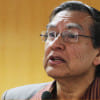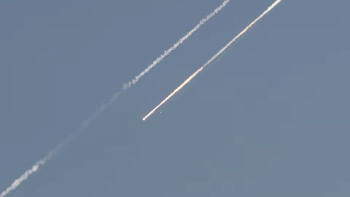Gen Moeen goes public on politics
One of the accusations made against The Daily Star and its editor in parliament last Sunday was that we had encouraged the army's involvement in politics. We want to state categorically that we never stood in support of anything but democracy. During the emergency caretaker period, we constantly wrote in favour of election and restoration of power to the elected representatives.
Today we reproduce a commentary published on April 6th, 2007, criticising the then army chief for making a speech on the future political structure of the country and advised that the army should remain focused on holding election and return to the barracks immediately after.
This commentary should make clear our position on army's involvement in politics. In addition, throughout the two-year period we wrote 203 editorials demanding restoration of democracy and handing over power to elected representatives through free and fair elections.
- Editor
Now that Chief of Army Staff (CAS) Lt Gen Moeen U Ahmed has decided to go public on political issues, he must be ready, willing and open to public debate on them including criticism of his views, if any.
To start with, should a sitting CAS speak in public and in presence of the President on the political future of a country? Such speech making will naturally raise questions as to whether or not the army chief or his institution plans to get involved in the country's politics? When such comments touch even the structure of the future government and the power balance between the President, the Prime Minister and the cabinet, the question in the public mind acquires more poignancy. So what do we make of the General's speech? Was it a mere intellectual exercise? Or a purposeful floating of ideas to gauge public reaction? On both counts there should be wide ranging discussions, in fact public debate, on the very important questions that he has thrown open.
As to the timing, we feel that such a policy speech on the future direction of the country, its politics, its government, its political parties and several vital related issues should have come, as a part of the reform agenda, from the head of the caretaker government which is being ably backed by the armed forces. Coming from the head of the army, it has given rise to the question as to whether there are differences of views between the government and its most important backer. The situation is further complicated by the fact that the Chief Adviser was away attending his first summit as the head of the government when the speech was made. Imagine his discomfiture when such a fundamental policy speech is made about the future structure of the government without him being anywhere near the picture. How much credibility is he likely to enjoy under these circumstances? How seriously will the world leaders and global media take him from now on?
So far the armed forces had done very well in remaining behind the scene. Now that has changed. The CAS' speech told the nation, as well as the world, as to who really is running the show. Does this coming out into the open serve the interest of the nation and that of the armed forces? From now on the full responsibility for all political decisions, both good and bad, will automatically fall on the armed forces. They are now out in the open with all the attending vulnerabilities.
On the questions of the CAS' idea of "having our own brand of democracy" we want to point out that our first brush with a General in politics was with Ayub Khan back in 1958 and he wanted to "reinvent democracy according to the genius of the people" and we ended up having "basic democracy" that was thoroughly rejected by our people, though it took a while. Much later in Pakistan came Gen Ziaul Huq who also wanted to redefine democracy. His was quite a clever ploy and very original. In order to deprive the Pakistanis of exercising their right to elect a government Zia said " I cannot accept democracy where sovereignty belongs to the people. In my book sovereignty only belongs to Allah". So Ziaul Huq ran Pakistan under his personal fiat, as acceptingthe sovereignty of the people was against his belief. Ask any Pakistani for the great and irreparable damage he had caused to their country.
In independent Bangladesh, the first unfortunate entry of military into politics was the dastardly murder of Bangabandhu along with his family (save two daughters) by a section of army officers and troops. This was followed by the killing of four national leaders in the jail, coming of power of Gen Ziaur Rahman, his shameful act of indemnifying Bangabandhu's killers and the subsequent tragedy of his killing by another section of the armed forces. None of these brought any credit to our army and contributed in making them more and more controversial and their intervention into politics hated by the people in general.
We all remember Gen Ershad whose own version of "democracy" gave corruption for the first time its massive and destructive character. He was truly the father of mass corruption from the curse of which we have never recovered.
Tragically, our elected leaders instead of stemming the rot only expedited it further until it became so very unbearable that we had to have emergency to save us from it.
It took our armed forces 16 years (1991-2007) to recover from the ignominy that Gen Ershad had brought upon them. It is to their tremendous credit that through sheer professionalism, dedication, discipline and, most importantly, staying out of politics that our Armed Forces regained their reputation and the place in the hearts of our people. Their ever readiness to help during natural disasters and their services to humanity through international peacekeeping have earned them pride of place in the global community and as well in our midst. Public respect for them got further consolidated when in 1996 the armed forces collectively fought back their own members in an attempt to capture political power.
So what is the collective experience of military interventions in politics globally, in South Asia and in Bangladesh? There are some definite short-term gains but in the long run they never work. As we see here the emergency has done wonders like arresting those in business who thought they were above the law, forcing necessary changes in the system that had been usurped by vested interest, catching well known criminals, etc. Emergency cannot last for long, nor can army's intervention.
It has been shown time and again that the only durable solution to political crisis is political reform and subsequent return of power to elected leaders. There is just no other way. As it is said, the only method to cure flaws in democracy is to have more of it, so also the best way to have good politics is to have pro-people political reforms and their quick implementation followed by election to restore representative government. This is the only route to durable solution. Everything else is short-term and any attempt to prolong it is fraught with danger.
The fundamental truth for us is that we need political reforms so that democracy can be practised as it was meant to be. We need, in Lincoln's words, a "Government of the People, By the People and For the People". Such a government can only come from a truly free and fair election devoid of intimidation, black money and muscle power. That is what the emergency came for and that is what the emergency should stick to. As the CAS knows so very well that the best guarantor of success of any military mission is to keep its objective focused. Any widening of the objectives brings into the picture unknown factors and hidden enemies that jeopardize the whole operation.
Translated into the present scene, the objective of the emergency should be its original focus to hold a free and fair election within the shortest possible time so that true leaders of the people can run the country. The objective also was to cleanse our politics of the criminals and the corrupt and bring about fundamental political and electoral reforms.
There exists an unwritten consensus on the above reform agenda. The emergency and the armed forces behind it enjoy public support simply because people see them as a force for good, implementing the reform agenda. Any deviation from it, and widening of objectives or changing of direction will cause an immediate evaporation of public support. This may dismantle the present edifice causing immense damage to our prospect of a better future. We have missed so many opportunities to change our course for progress. We cannot afford another one.
Simply put, we strongly feel our armed forces should not involve themselves in politics. They have a mission behind which there is popular support, which they should accomplish and return to their barracks. This will tremendously enhance their moral standing and bring them far greater dividend in terms of love and respect of the general people, which is the greatest gift for any patriotic army. And ours is such an army.
In the past both the political parties and their sycophants saw our critical views as antagonistic ones. As a result, arguments made out of genuine effort to help were taken as attempts to weaken, to damage or even to destroy them. So instead of examining what we said, we were harassed for having said them. Given the professionalism, the high level of education and global exposure of our armed forces and especially of their leaders, we hope our sincere attempt to help will be seen as such.

 For all latest news, follow The Daily Star's Google News channel.
For all latest news, follow The Daily Star's Google News channel. 




Comments